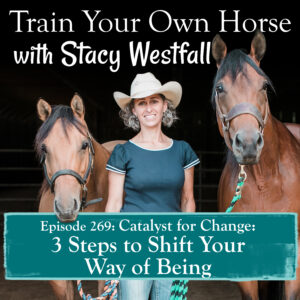Episode 269: Catalyst for Change: 3 Steps to Shift Your Way of Being
January 10, 2024/

In this episode, you’ll learn a simple 3-step process for turning your ‘way of being’ into something actionable. Examples of “Way of being goals.” include:
- do what is best for my horse
- have a closer relationship with my horse
- ride confidently without anxiety
- understand my horse’s behavior better
- to enjoy showing again
The problem or challenge with these types is that they often seem hard to define, and even harder to move into action, but it is possible. In less than two minutes a day, you can achieve a transformation that will not only impact you, but those around you…including your horse.
SUBSCRIBE TO THE PODCAST HERE:





YOURS FREE
WHY IS MY HORSE...?

